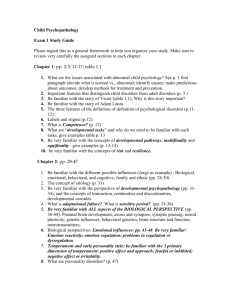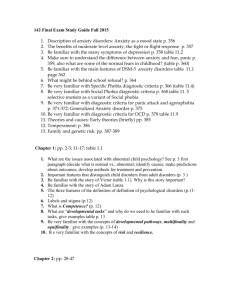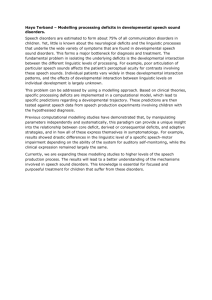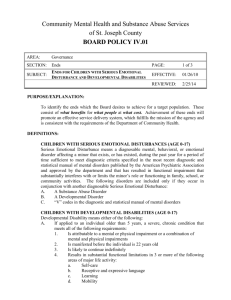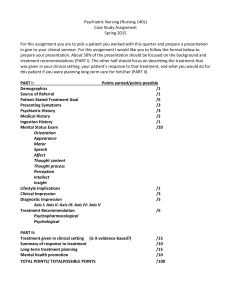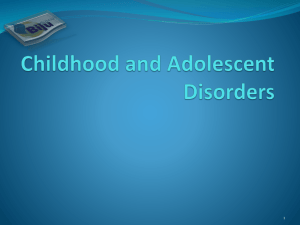Mental Health Assessment In an Ambulatory Setting
advertisement
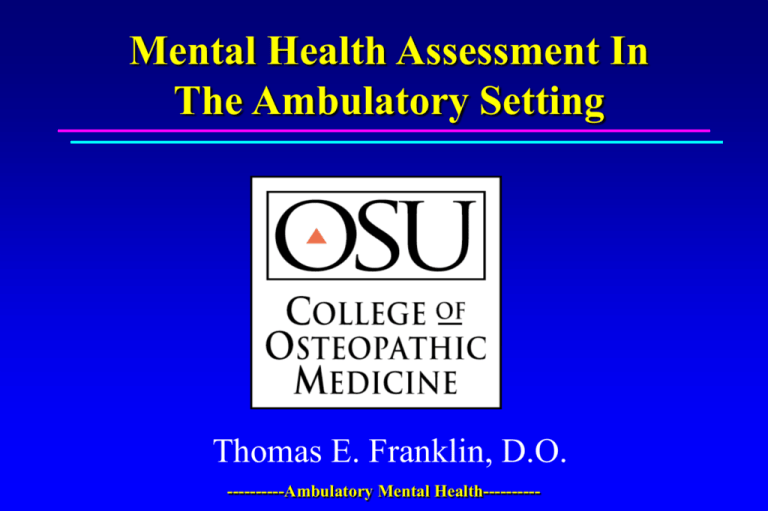
Mental Health Assessment In The Ambulatory Setting Thomas E. Franklin, D.O. ----------Ambulatory Mental Health---------- Introduction • Psychologically impaired individuals frequently consult primary care physician with somatic complaints. • Minor and major events may cause impaired mental health in previously healthy individuals. • Primary care physicians need system to identify mental health issues for treatment ----------Ambulatory Mental Health---------- Objectives • • • • Take pt., social & developmental history Perform mental status examination Recognize coping responses, co-morbidities Determine competence, decision-making capacity and need for commitment. • Formulate plan to address mental impairment ----------Ambulatory Mental Health---------- Information Gathering • Information from many sources (patient,family, police, EMS, other health care facilities, employer) all valuable • Current medications, illicit drugs, alcohol – May cause depression, psychosis, delirium, etc. ----------Ambulatory Mental Health---------- Social & Developmental History • Profile patient’s current life situation – Marital status, family, education, job – Family history invaluable – Conflicts, losses, self view, etc. • Recent changes in patient’s life • Patterns & events shaping development ----------Ambulatory Mental Health---------- Social & Developmental History • Substance abuse and/or domestic violence • Social factors related to psychological symptoms: – Loss: personal due to death or desertion – Conflict: interpersonal within family, work – Change: adolescence, menopause, senescence – Maladjustment: home, work – Stress: unexpected event or chronic problem ----------Ambulatory Mental Health---------- Social & Developmental History • Isolation: not due to any recent loss, change • Failure or frustrated expectations: patient’s life’s goals not realized (e.g. failure at school, loss of job, non promotion). ----------Ambulatory Mental Health---------- Mental Status • Appearance: Grooming, attention to dress, motor activity (quiet versus agitated). • General level of consciousness: Alert, sleepy, stuporous, obtunded. • Orientation: Person, place, time, purpose ----------Ambulatory Mental Health---------- Mental Status • Speech: Ability to use customary syntax. Note slurring, inability to find the right word, pressured speech, flight of ideas, looseness of association, muteness. • Memory: Recent memory-knows recent events, capacity to remember names of current treating physicians. Remote memory-ability to give past medical history. ----------Ambulatory Mental Health---------- Mental Status • Attention and concentration: Ability to understand and follow questions or instructions. • Intelligence: Can be estimated from level of schooling achieved, vocational history, use of language. • Mood: Pervasive,sustained emotion described by patient (anger, anxiety, etc.). ----------Ambulatory Mental Health---------- Mental Status • Affect: An observable and immediately expressed emotion (anger, anxiety, sadness, fear, humor, etc.). Is affect consistent with content of speech, thoughts, and behavior? • Suicidal thoughts: Statements or actions that indicate the patient wishes to harm or kill himself. • Homicidal or violent thoughts: harm or kill others ----------Ambulatory Mental Health---------- Mental Status • Perceptions: Presence of hallucinations (visual, auditory, or somatic perceptions occurring without external stimuli), delusions (fixed beliefs which are false), paranoid ideas, or persistent phobias (fears directed toward specific objects or situations). ----------Ambulatory Mental Health---------- Mental Status • Judgment: Capacity to understand one’s current situation and/or to demonstrate appropriate compliance with instructions for care. ----------Ambulatory Mental Health---------- Coping Responses • • • • • Denial Rationalization Regression Projection Displacement ----------Ambulatory Mental Health---------- Recognizing Family Co-morbidity • Assume co-morbidity with chronic problems: – Alcoholism – Affective disorders – Anxiety disorders – Somatoform disorders ----------Ambulatory Mental Health---------- Determining Competence • Competence and incompetence – Legal terms, restricted to formal judicial determinations ----------Ambulatory Mental Health---------- Determining Competence • Decision-Making Capacity – Capacity to comprehend information relevant to decision – Capacity to choose re: personal values and goals – Capacity to communicate (verbally or nonverbally) with caregivers ----------Ambulatory Mental Health---------- Determining Competence • Commitment Laws – Most states require physician examination to determine whether the patient is of danger to self or others – not necessarily psychiatrist ----------Ambulatory Mental Health---------- Formulation of Mental Impairment • Five-Axis Approach (APA) – Axis I: • Psychosocial syndrome(s) • Conditions not attributable to a formal mental disorder e.g. malingering, uncomplicated bereavement, noncompliance with medical treatment, academic or occupational problems, etc ----------Ambulatory Mental Health---------- Formulation of Mental Impairment • Axis II: Personality disorders or styles and specific developmental disorders. • Axis III: General medical conditions • Axis IV: Psychological and environmental problems. • Axis V: Global Assessment of Functioning; current level and highest level for at least a few months during past year. ----------Ambulatory Mental Health---------- Summary • Systematic approach is needed – History • Developmental • PMH, medications, alcohol / substance abuse • Marital, family, job history • Recent events, changes, losses – Mental status examination • FP’s can care for many psychiatric problems ----------Ambulatory Mental Health---------- References: • American Psychiatric Association: Diagnostic and Statistical Manual of Mental Disorders, Fourth Edition (DSM-IV). Wash DC, American Psychiatric Association, 1994. • Cadoret RJ: In: Cadoret RJ, King LJ (eds): Psychiatry in Primary Care. St. Louis, CV Mosby, 1983. Chap 2. ----------Ambulatory Mental Health----------
